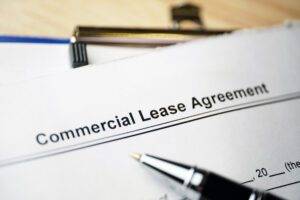Understanding Commercial Leases

<?xml encoding=”utf-8″ ?????????>
Commercial leases are a crucial part of many businesses, but they can be complex to navigate without the proper guidance and understanding.
This article aims to break down the essential aspects of commercial leases and help you understand their importance for your business.
What is a Commercial Lease?
Commercial leases are legal agreements that outline the rights and responsibilities of the tenant and landlord for a commercial property. These properties include offices, retail spaces, and other types of businesses. As opposed to residential leases, commercial agreements are more complex and often carry substantial financial implications. Before signing a commercial lease, it’s crucial to research thoroughly and understand the terms and conditions to prevent future misunderstandings and disputes.
Key Terms in Commercial Leases
Lease period
The lease period determines the duration your business is allowed to occupy the property. Businesses often prefer long-term leases for stability and avoiding the hassle of frequently moving premises. However, shorter leases may be more desirable if your business is new or if market conditions are uncertain.
Rent
The cost of rent and how it is calculated is an essential aspect of any commercial lease. It is usually calculated on a per square meter basis, and amount payable may also vary based on location, property type, and market conditions.
Maintenance and repair
Understanding which party is responsible for maintenance and repairs is critical. In some leases, the tenant is responsible for all maintenance and repairs, while others may dictate that the landlord covers certain costs.
Modifications and improvements
If you have plans to modify the property to suit your business, you’ll need to check whether your lease permits these changes. Some agreements may allow for modifications and improvements, but often, the landlord must approve them first.
Understanding Lease Negotiations
Part of understanding commercial leases is grasping the importance of negotiation. Unlike residential leases which are often standardized, commercial leases are usually open to negotiation. This flexibility allows both parties to make changes to the agreement to better meet their needs. However, expertise in lease negotiations is necessary to guarantee a favorable outcome.
The Importance of Reviewing Commercial Leases
A commercial lease forms the foundation for your business location, and any error or oversight in your lease could have significant consequences for your enterprise. Therefore, it’s crucial to meticulously review every detail before signing the dotted line.
Reasons for Conducting a Thorough Review
Identifying Hidden Costs
Commercial leases can have embedded charges that are not apparent at the outset. These may include costs for maintenance, utilities, and insurance. To avoid unexpected losses, review all clauses to uncover any hidden costs associated with the lease.
Understanding Your Rights and Obligations
A comprehensive review will ensure you grasp the rights and obligations detailed in your lease. For instance, it’s important to understand the process for resolving disputes or the conditions under which the lease can be terminated.
Ensuring Lease Flexibility
The economic environment and your business can evolve and change over time. Ensuring your lease has flexibility provisions, such as the capability to sublet, can provide some flexibility for potential future changes.
Steps to Reviewing a Commercial Lease
Engage an Expert
While being in the shoes of a business owner is exciting, the reality is that commercial leases are intricate legal documents that require expertise in contract law and real estate to fully comprehend. An expert can guide you through the review process, spot potential threats, and negotiate more favorable terms on your behalf.
Go Over Every Clause
Don’t skip any clause, and scrutinize every aspect of your agreement. Even seemingly inconsequential clauses could have substantial implications.
Collect Comparable Data
Research what other tenants are paying for similar spaces in your area. This will give you an idea of whether your proposed rent is reasonable or exorbitant.
Discuss and Negotiate
Don’t accept the terms at face value. Commercial leases can often be negotiated to better suit your business’s needs. If any terms are unfavorable, discuss these with your landlord or their representative.
A deep understanding and comprehensive review of your commercial lease will help ensure your business’s financial health and success.
Navigating the Legal Aspects of Commercial Leases
Concluding a commercial lease can seem like a daunting task, particularly for new business owners. After all, such leases are usually lengthy documents full of legal jargon that can be hard to decipher. However, a sound understanding of the legal aspects can protect your business from potential pitfalls and ensure fruitful operation.
Some Common Legal Provisions in Commercial Leases
Indemnity Clauses
Indemnity clauses protect landlords from any liability arising from the tenant’s use of the property. This could include damage due to accidents or negligence. As a tenant, it’s essential to understand and potentially negotiate these clauses to avoid undue liability.
Subletting and Assignment
Those clauses determine whether the tenant can sublet the property or assign the lease to another party. If your business model entails flexibility, you might want to negotiate a lease agreement that allows subletting or assignment.
Default Remedies
These clauses list the actions the landlord can take if the tenant defaults on the lease. Default can include failure to pay rent or breaching other lease terms. The agreed remedies can range from eviction to financial penalties.
Legal Support for Commercial Lessees
Given the importance and complexity of commercial leases, it’s advisable to seek appropriate legal assistance. Legal professionals can provide guidance in understanding the terms and implications of your commercial lease, helping you avoid any hidden liabilities and negotiate better terms.
Conclusion
Understanding the legal aspects of commercial leases is crucial in safeguarding your business. This will enable you to operate from your commercial premises without worrying about potential legal issues, thereby fostering peace of mind and focusing on growing your business. Always remember to scrutinize all the terms of your lease and seek legal assistance when necessary.




